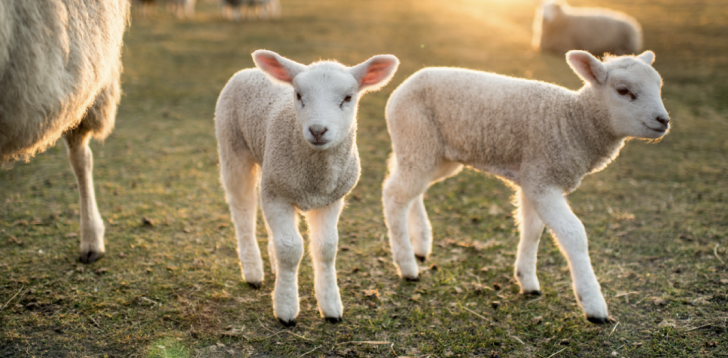In the rich tapestry of Bahá’í teachings, the notion of sacrifice transcends the mundane interpretations commonly associated with the term. At its core lies a profound spirituality—an invitation to delve deeper into the very essence of existence, illuminated by the framework of divine guidance. This exploration leads us beyond the archetype of the lamb, an emblem often associated with innocence and vulnerability, toward an expansive understanding of sacrifice as both a personal and communal journey.
Traditionally, sacrifice evokes images of loss, suffering, and renunciation. However, within the Bahá’í paradigm, it embodies a transformative process. This concept can be meticulously dissected into its spiritual, psychological, and metaphysical dimensions. The act of sacrifice is portrayed not merely as a relinquishment of earthly gains or comforts but as an enriching experience, a sanctified tool to foster spiritual elevation.
To embark on this journey, one must grapple with the implications of selflessness. Sacrifice, in this dynamic framework, serves as a catalyst for relinquishing the self in favor of the collective. The Bahá’í writings extensively emphasize the interconnection of humanity, urging individuals to synchronize their personal aspirations with the greater welfare of society. In doing so, the act of sacrifice morphs into an empowering position—the elevation of the self toward a more profound union with the world.
Now, let’s consider the psychological ramifications of this transformative sacrifice. The Bahá’í teachings assert that true fulfillment arises when one transcends the ego, seeking instead to serve humanity. Such an approach catalyzes a seismic shift in perspective. Sacrificing personal desires for the greater good not only augments one’s own sense of purpose but also engenders a deeper connection to humanity at large. This interplay is not merely theoretical; it is profoundly experiential. Individuals frequently recount instances where acts of service, rooted in sacrifice, lead to unexpected joy and enlightenment.
The metaphysical aspects of sacrifice introduce another layer of complexity. Within the Bahá’í view, every sacrifice performed resonates within a larger divine narrative. This broader cosmic perspective encourages adherents to recognize that their personal struggles and contributions are part of a grander scheme authored by the Divine. Thus, every act of sacrifice is not just an isolated deed but a thread woven into the intricate fabric of universal purpose. Through this lens, followers come to understand that their personal journeys contribute to the unfolding of divine will—not only for themselves but for generations yet to come.
Central to this understanding is the concept of the “Greatest Name” of God, often revealed through the writings of the Bahá’í prophets. Each name symbolizes a distinct attribute of God, which humanity is encouraged to manifest. Sacrifice, reflecting the divine essence, embodies the highest form of love for others—a love that is willing to endure hardship for the sake of collective well-being. This notion aligns with the Bahá’í imperative to foster unity and collaboration, echoing the understanding that true sacrifice is also the genesis of community building.
Moreover, the teachings invite followers to reflect on historical narratives that illuminate the power of sacrifice. Throughout the annals of history, pivotal moments of societal transformation have often been predicated on the sacrifices made by individuals imbued with vision and courage. The story of the martyrdom of the Báb, for instance, serves as an example of selfless dedication to a cause greater than oneself. His ultimate sacrifice laid the groundwork for the emergence of the Bahá’í Faith and stands as a testament to the transformative potential inherent in sacrifice. Such reflections not only kindle curiosity but provoke profound introspection within adherents as they ponder their roles within this ongoing narrative.
As one engages with the essence of sacrifice, it becomes apparent that such acts extend beyond the confines of personal ambition. They morph into a collective ethos—one that propels humanity toward higher ideals. In the Bahá’í perspective, the ultimate sacrifice transcends physicality, urging seekers to re-evaluate notions of success and achievement. Instead of perceiving sacrifice as deprivation, one is encouraged to view it as an opportunity for spiritual amplification, signaling a shift from material success to moral and ethical fortification.
This journey of understanding facilitates a deeper connection with both the self and others. As one embraces the principle of sacrifice, it becomes an invitation to explore alternate avenues of existence—venues characterized not by material wealth but by spiritual richness. This ongoing evolution encourages sustained curiosity about the nature of existence, propelling adherents to engage with foundational questions surrounding purpose, community, and the overarching narrative of humanity.
The path of sacrifice within the Bahá’í teachings thus emerges as a multifaceted journey steeped in divine wisdom. It transcends the simplistic notion of loss and finds expression in the beauty of contribution, love, and interconnectedness. Encouraging individuals to seek a higher order of existence, it invites a new way of being—one that harmonizes personal aspirations with the collective human experience. In embarking on this profound journey, one likely encounters a transformative shift in perspective, opening the door to a deeper understanding of sacrifice that resonates through time and space. This reimagining leads to an expansive curiosity, empowering individuals to not only seek out knowledge but to embody the spirit of service that is at the very heart of Bahá’í teachings.
